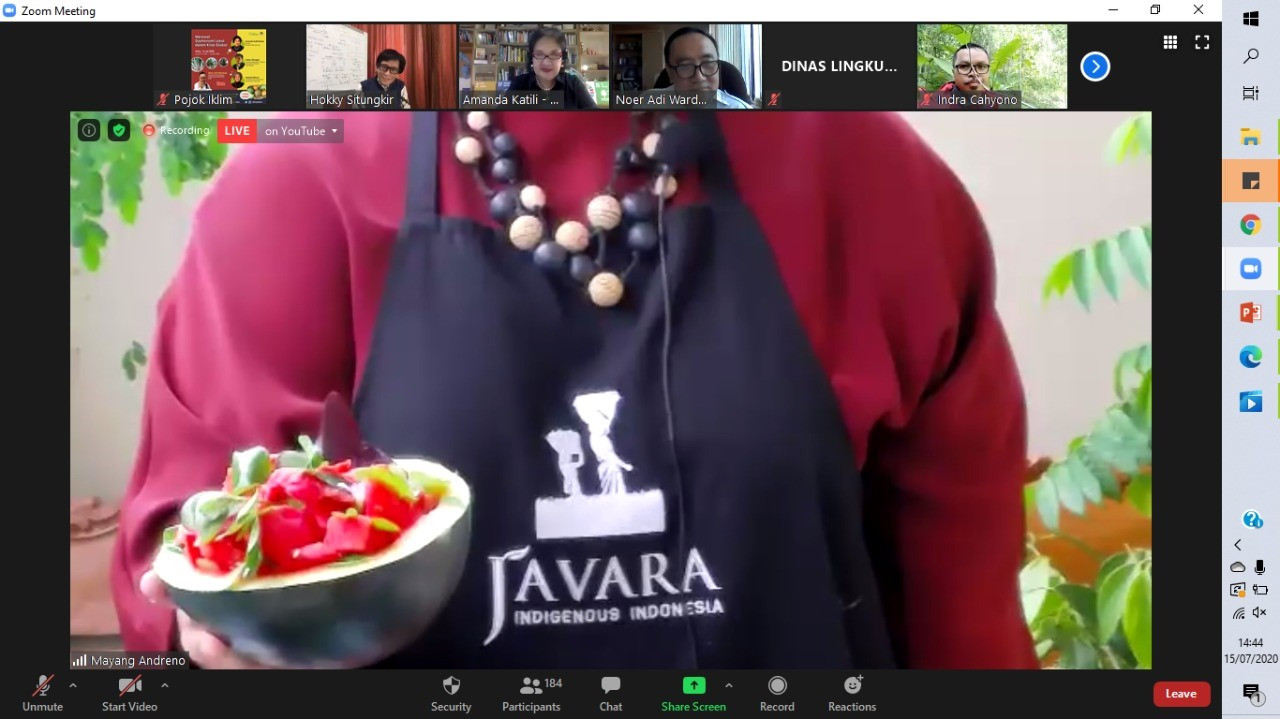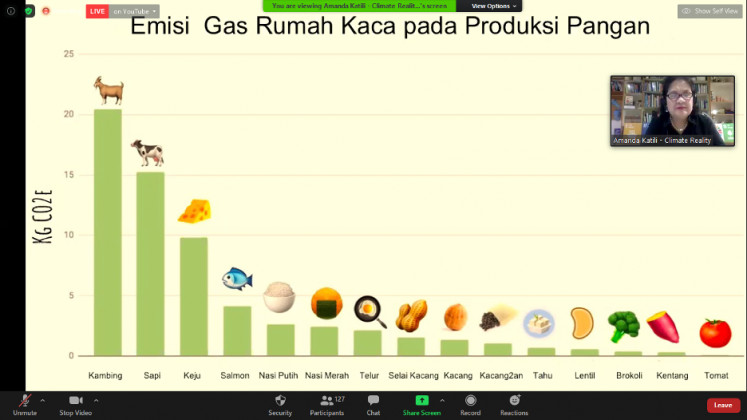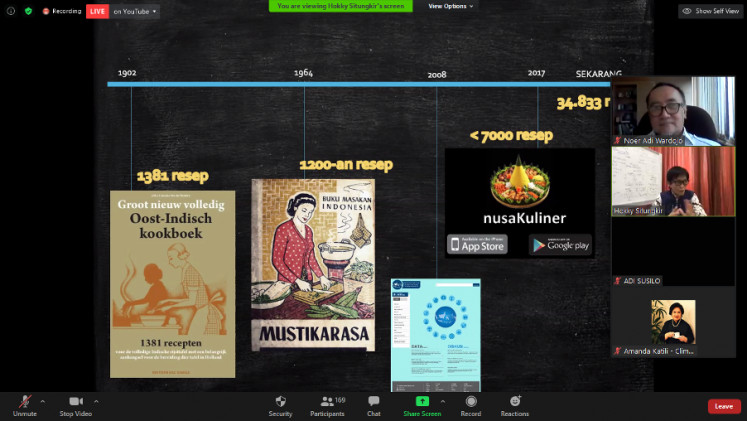Popular Reads
Top Results
Can't find what you're looking for?
View all search resultsPopular Reads
Top Results
Can't find what you're looking for?
View all search resultsEating ethically during a global crisis
Research by the European Commission concluded that agriculture is the single greatest contributor to climate change.
Change text size
Gift Premium Articles
to Anyone
A
digital seminar held by government-backed organization Pojok Iklim (Climate Corner) discusses the importance of sustainable gastronomy in combatting the climate change crisis.
The art of dining has become more than a means of provision and sustenance but has evolved into a social, entertaining ritual, ingrained within cultures worldwide. However, there is an ethical dilemma behind this related to the ingredients used to create these expressions.
Research by the European Commission concluded that agriculture is the single greatest contributor to climate change. With the ongoing pandemic and panic-buying, it is integral – now more than ever – to commit to a sustainable, ecofriendly outlook on food purchase and preparation and play a part in minimalizing the global climate change crisis.
On July 15, Pojok Iklim, an initiative founded by the Environment and Forestry Ministry to combat climate change, held a webinar regarding the state of gastronomy during a global crisis.
Moderated by the ministry’s environment and forestry standards head, Noer Adi Wardojo, the digital seminar called upon three specialists to discuss and demonstrate the state of food production and preparation.
The first speaker, Amanda Katili Niode, manager of the nonprofit organization Climate Reality Project Indonesia, discussed the importance of food in cultural and social rituals, and its grave impact on the climate change crisis.
To overcome the detriments of the current food system, Amanda proposes the idea of “sustainable gastronomy”.
“According to the Food and Agricultural Organization [FAO], gastronomy is sometimes called the art of food or refers to the type of cooking in a specific region. Sustainability is something – such as the farming or preparation of food – that is done without the waste of natural resources and can continue occurring in the future without destruction to the environment or health,” she explains.
Greenhouse gases and agriculture: Amanda Katili of Climate Reality elaborates on the carbon emissions generated in modern food production. (Pojok Iklim/-)Amanda discusses the role of food in everyday life, observed in multiple facets of one’s tradition, identity and community, and brings about the importance of sourcing ingredients locally to reduce global carbon emissions. The invigoration of local economies, support for small local businesses and farmers, reduced greenhouse gases and food waste, as well as health in the freshness of products, are some of the other advantages, she noted.
The president of the Bandung Fe Institute and chairman of the Sobat Budaya (Friends of Cultures) board of trustees, Hokky Situngkir, further elaborated with a data-driven concept of culture and food. Hokky talked about the wealth of cuisine in Indonesia and the local ingredients that foster the uniqueness of the country’s cooking.
“There are 40,000 recorded species of seeded plants in Indonesia, but not all are included [in our database]. This means that the excavation of culture and the exploration that we can undertake can provide us with a new culinary frontier” he said.
Through his research cataloging Indonesian recipes and ingredients, Hokky deduced that most traditional food requires over 10 spices, with 90 percent of the spices used occurring exclusively in Indonesia, highlighting the effect of native plants in shaping local cuisine and the many functions that surround it.
He proposes that traditional preserved food such as meat floss, salted egg and roasted sago may be viable food sources during extraordinary events like the current COVID-19 pandemic in its locality and shelf life.
Digitization of cuisine: Hokky Situngkir from Sobat Budaya presents a historical timeline of recipe collection in Indonesia. (Pojok Iklim/-)Meanwhile, food biodiversity entrepreneur and founder of artisanal food company Javara Indonesia, Helianti Hilman, shared her thoughts on preserving and sustaining the biodiversity of native Indonesian plant species and provided a cooking demonstration of her take on fresh watermelon salad.
Helianti stressed the importance of making sustainable gastronomy accessible to a wider range of individuals in an attempt to increase food appreciation and promote healthy, nutritional eating.
Talking about her experience building Javara, Helianti noted the lack of appreciation in Indonesia for organic, local foods when she started her company 12 years ago.
“We didn’t have a place in Indonesia, we were like the stepchild, as it is said. We weren’t considered cool, and back then, local brands weren’t appreciated, there was also no trend for organic food, so we were forced to export our products,” she said.
However, years after this, Helianti noticed that local sales increased due to international recognition.
Helianti emphasized the importance of contextualizing ingredients to consumers and the role of market relevance – adapting local ingredients in order to fit into a wide variety of cuisines and follow trends – in the quest to conserve the perishing, edible plants native to Indonesia.
Perhaps the key to improved food security, reduced carbon emissions and better eating lie in the younger generations. In recognizing this, each speaker promoted their distinctive calls to action.
With the development of an open-source digital library, budaya-indonesia.org, and the mobile application nusaKuliner, Hokky has ensured that the cultural affluence of Indonesia – beyond food – remains preserved and available to all.
He explained that out of almost 10,000 contributors, the growing majority of users are youth, demonstrating the increased awareness and interest in culture among newer generations.
On a similar note, Helianti noted that Javara was initially popular among individuals 50 years old and above, looking for ingredients to treat their health problems. However, with the rise of foodie culture and a newfound appreciation for local brands in recent years, the millennial segment dominates most of their customer base.
Javara and its offering of niche products local to Indonesia promote the benefits of native ingredients, providing new life and preservation to lesser-known, neglected greenery.
Lastly, Amanda promoted the Food & Climate Shapers Digital Boot Camp, created by the Food and Agricultural Organization of the United Nations, an online advanced learning program aimed to empower the youth to eat sustainably.
She also introduced another initiative promoted by the UN, Chef’s Manifesto, which involves over 700 chefs from 77 countries.
“These chefs have asserted that we shouldn’t be asked to overcome the world’s large problems. We will carry out the tasks that we are able to do, with pleasure,” Amanda said.
The writer is an intern at The Jakarta Post.













